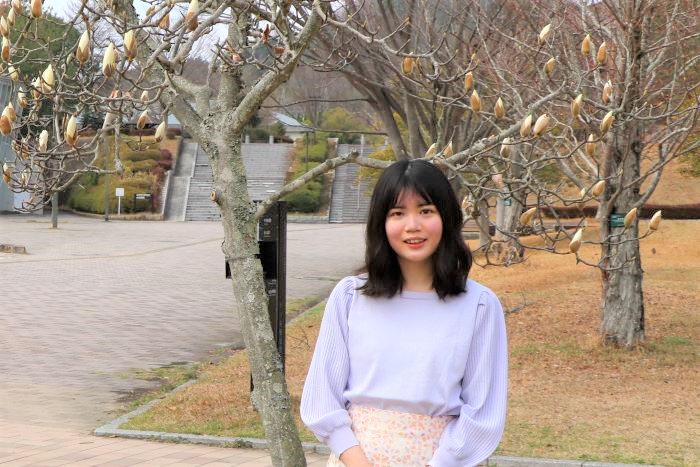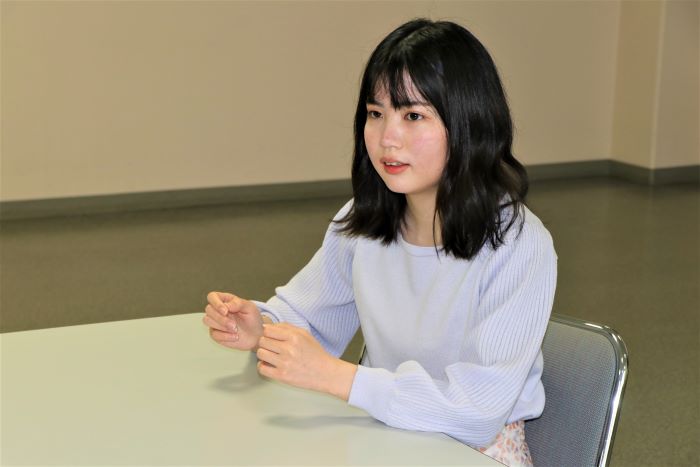
Haruna Katayama became an assistant professor at Hiroshima University this spring and is currently studying abroad at a university in the United States. She spoke with us about her career plans and what led her to graduate from the School of Integrated Arts and Sciences at Hiroshima University, pursue a master's degree, and then move on to a doctoral program.
Why did you decide to advance to the doctoral program?
During both my undergraduate and master's years, I wavered between continuing to higher education and finding a job. I was also anxious about whether I should continue as a student while everyone else was getting a job, and I wanted to reassure my parents by getting a job as soon as possible.
I also experienced various internships. I participated in a sales internship in the food and beverage industry during my third year of undergraduate school, and even at the beginning of my master's program, I participated in a two-week IT internship during the summer because, at that time, I was not thinking about going on to a doctoral program. However, I felt that neither suited me, and I started to feel that I wanted to make better use of what I had learned at university. Of course, it is important to complete assigned tasks, but I felt that doing research by setting my schedule was right for me. In the spring of my master's degree, I participated in an internship for a research position, but the majority of the participants were Ph.D. students, which made me realize my lack of knowledge. I had heard that it was difficult to get a job as a theorist without a Ph.D., so I felt strongly that I had to obtain a Ph.D.
What were some of the difficulties or concerns you had when entering the doctoral program?
The hardest time for me was when I had to decide whether or not to go on to a doctoral program.
Because I had a feeling of both wanting to find a job as soon as possible and wanting to continue my research, I wondered which life would make me happier: to find a job in a field other than research or to enter a doctoral program to pursue a research career. If pursuing a career as a researcher, I had to be prepared for an unstable future because there were no regular job openings and no assurance of a future post. I was worried about whether I would do well as a researcher, so I asked myself the question of which path to take again and again before deciding my future.
You must have wondered a lot about whether or not to go on to higher education. Did you consult with anyone when you were wondering?
My advisor, Professor Hatakenaka, was very kind and listened to me. He also had experience working at general corporations, so it was really helpful for me to understand the situation at both the company and the university.
My family also supported my decision to go on to higher education and encouraged me to do what I wanted to do. I think I was able to make the decision to go on to higher education in large part because I was blessed with people who understood my desire to go on to higher education.

Can you tell us about your current research theme?
My research theme is to identify the existence of radiation from a black hole (Hawking radiation), which is an unsolved problem. I am creating a pseudo black hole in an electric circuit and using it to construct a laser theory. Initially, I was not researching the universe, but in my fourth year of undergraduate school, I was studying how waves propagate in electronic circuits, which evolved into the idea that these waves could be black holes.
I see. So, when did you first become interested in these science subjects?
Since elementary school, I have always liked math and science, which have clear answers. I tend to forget memorization-based subjects, but I never forget how to do calculations once I understand the procedure (laughs).
What are your future career plans?
I hope to be able to continue my research and become a global person who can interact with overseas researchers on an equal footing and engage in research. Also, I hope to make new discoveries that will be useful in the future.
Was there anyone who was a role model for you when thinking about your career plan?
All of the physics professors in my current graduate school are male, so it is difficult to directly replace them with myself, but I would like to be like my advisor. There are very few women who have advanced to doctoral programs in the same field.
What are some good points about studying at Hiroshima University? (faculty, seniors, facilities, etc.)
The most important thing is that I found what I wanted to do. When I was in high school, I had no idea what I wanted to study, but because I was in the School of Integrated Arts and Sciences, I was able to study a wide variety of fields in my first year, and from my second year, I was able to study other fields while focusing on my specialization, so I was able to acquire a multifaceted perspective. This perspective has been useful in my current research.
Another thing is that I was blessed with the opportunity to have many encounters with people. In addition to my academic advisor, there are many professors at Hiroshima University who are conducting cutting-edge research and are very kind. Perhaps it is unique to universities, but I think it was also good that I was able to make friends from a variety of fields.
It was also very helpful that I was able to receive support from the university for expenses to go to international conferences and for publication fees. This reduced my financial burden and motivated me to actively present papers abroad.
What do you think is needed to make it easier for women to pursue higher education?
I was worried that female researchers would have a break due to life events such as marriage and childbirth and that it would not work out well for them.
But now that I know that there is a lot of support for female researchers, I realize that there is no need to feel disadvantaged. I believe that if we widely publicize these support programs to reach those who are wondering about entering graduate school, and present role models that they can imagine becoming decades from now, more students will be inspired to give it a try themselves.
Do you think the preconceived notion among women, as well as society, that "women are not suited for science" is true?
In actual fact, there are very few women majoring in physics, so I understand that it is inevitable that there are voices like that, but I don't think it is true that women are not suited for the major.
It is important that people around don't instill such preconceived notions. If a teacher were to have the idea that women are not suited for the sciences, even if the teacher did not directly express it in words, it would be conveyed to the students, and they would probably assume so.
While I would like to see women's activities highlighted, I do not want to see only women being singled out for special treatment. I would like to see a society where those who work hard, regardless of gender, are well supported.
What advice would you give to juniors who are considering entering a doctoral program?
Ms. Katayama in academic gowns after the degree ceremony
I also worried a lot about my career path and was often anxious. At those times, I prioritized what I wanted to do and what I thought would be most enjoyable, so I think it is important to think carefully about what it is that you want to do. There will always be difficulties and adversity. I hope that you will do your best and overcome them.
March, 2022
Interview and Photograph: Public Relations Group (H)
Location: Administration Bureau


 Home
Home

